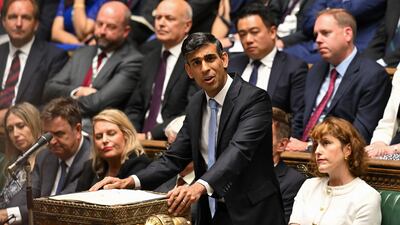Goodbye then, says Britain to Rishi Sunak. We’ll see you on the other side – of the parliamentary benches, that is. You led the UK government for 22 months, as the country’s first prime minister of Asian heritage, a man whose Hindu parents came from East Africa.
New Prime Minister Keir Starmer noted the significance of Mr Sunak’s premiership in his first address outside 10 Downing Street: “His achievement as the first British-Asian prime minister of our country, the extra effort that that will have required, should not be underestimated by anyone.”
The first MP of Asian heritage was Dadabhai Naoroji, elected in 1892 as the Liberal MP for Central Finsbury with a majority of three votes. It took a further 130 years before Mr Sunak’s election put him into a prime ministerial club of “firsts” that is small but notable: the first woman (Margaret Thatcher), the first of Jewish heritage (Benjamin Disraeli), the first from a working-class background (Ramsay MacDonald) and now Mr Starmer, the first to admit having no religion.
When Mr Sunak took office, I and many others noted that, given his background, it was a significant moment. But the marked lesson of his premiership is that judging a moment’s significance means also being able to distinguish between the individual and the system.
Did the individual change the system at all? Yes and no. The image of a proudly Hindu prime minister celebrating Diwali was embraced without widespread objection, suggesting equality. But across society, inequality – with respect to race, class or gender – didn’t appear to decrease under Mr Sunak in any noticeable way.
Was hatred – for example, anti-Semitism or Islamophobia – tackled head on? Yes and no. Sometimes simply being there is a statement that faces down hatred, so Mr Sunak’s presence in office was important. And three of the four UK administrations, plus the London mayor, were of Asian heritage.

And yet, discrimination and hatred also rose during his term – some might say, deliberately stoked by Mr Sunak’s party policies and politics. Many saw the flagship Rwanda deportation policy as pandering to the racist right wing. And closer to home, the Conservatives took donations from Frank Hester, a man who said that pioneering black female MP Diane Abbott made him want to “hate all black women”.
And, it must be said, Mr Sunak himself faced racism, most noticeably during the election campaign when he spoke emotionally about a racial slur used against him.
Furthermore, the culture wars – often stoked by other politicians of colour – have remained heated in the past two years.
So the symbolic impact of Britain’s first Asian-heritage prime minister must be distinguished from the systemic one. People can make their own minds up about whether he used his position to drive change and encourage more people up the ladder, or whether he pulled it up behind him.
When we advocate for a more representative workplace, especially in leadership, political and cultural roles, there is a distinction between having the same opportunities to be in those roles, and whether your background itself will make you good and be used to drive change on that platform for more representation.
As a general principle – irrelevant to what you think of Mr Sunak – equal opportunities for representation also means equal opportunities to be as terrible as everyone else.
When Theresa May stepped into the prime ministerial role – because nobody else wanted it – some spoke of a glass cliff: women stepping into career-ending roles because those of the status quo didn’t want to clean up the mess. Mr Sunak was defeated in his first leadership campaign by Liz Truss, who then barely made it to six weeks in office. And then it was Mr Sunak who walked off the glass cliff.
Should we feel sorry for any of them? Well, that’s up to you. Judge them by their policies and individual performance is my view.

Will Mr Sunak’s success be judged by a different yardstick than his previous white counterparts? It’s unlikely that a racist lens, conscious or unconscious, won’t be applied to him, and that what might be forgiven by the current electorate and history for a Boris Johnson for example will be held harshly against Mr Sunak. After all, Barack Obama’s presidency didn’t bring about a utopian post-racial US, and racism is far from over in Britain today.
But let us rejoice in this much at least. The fact that the milestone of the first minority-ethnic prime minister is now marked means the milestone itself no longer needs to be the measure of individual success.
I’m confident we can hold two big thoughts in our heads at the same time: honouring a significant, historic milestone, and still judging individual talent.
In fact, it may be even more significant than we realise, because it allows us to progress past the important but often simplistic need for representation at an individual level. The latter often risks entrenching the same homogenising racism that the campaign seeks to dismantle. If we want more representation, then “any old” Asian* heritage person (*replace with any other underrepresented group) fills this need. But now we get the chance to assess the person on their individual merits. And that at a national level is a huge and important shift in deconstructing bias.
In the Scottish elections in 2022, the same beautiful point was illustrated: both the Scottish National Party and Labour party candidates were of Asian heritage. The moment was appropriately remarked upon as pioneering, and then everyone was able to focus on distinguishing these two candidates from each other based on their individual ideas and policies.
So if there’s a legacy we should be thankful for, it is the ability to judge people on their individual qualities and performance rather than just their skin colour.


